Daniel Craig Skyfall
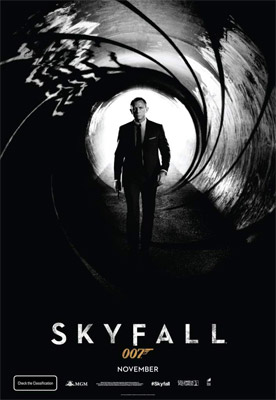
Skyfall
Cast: Daniel Craig, Dame Judi Dench, Javier Bardem, Ralph Fiennes, Albert Finney, Naomie Harris, Bérénice Marlohe, Ben WhishawDirector: Sam Mendes
Genre: Action
Synopsis: In Skyfall, Bond's loyalty to M is tested as her past comes back to haunt her. As MI6 comes under attack, 007 must track down and destroy the threat, no matter how personal the cost.
Q
Michael G. Wilson and Barbara Broccoli, producers of Skyfall, the 23rd James Bond adventure, have confirmed that the character of Q will be making a welcome return to the Bond franchise and the role will be played by Ben Whishaw.
Whishaw becomes the fourth actor to play Bond's quartermaster affectionately known as Q. The role began with Peter Burton as Major Boothroyd in Dr. No, followed by Desmond Llewelyn (in 17 Bond films between 1963-1999), and John Cleese (who appeared as Q's assistant, R, in The World is Not Enough and was later promoted to Q in Die Another Day).
Producers Michael G. Wilson and Barbara Broccoli commented, "It's a real thrill to confirm the return of Q in Skyfall played by the enormously talented Ben Whishaw. We are delighted to have this beloved character back in the series."
Ben Whishaw will be seen later this year in Cloud Atlas alongside an all-star cast including Tom Hanks, Jim Sturgess and Halle Berry, and in the BBC's "Richard II." He will also be seen in the second series of "The Hour" for the BBC, in which he stars opposite Dominic West and Romola Garai. His films include roles in Bright Star, The Tempest, Brideshead Revisited, I'm Not There, Stoned, Layer Cake, Enduring Love, The Trench, Mauvaise Passé, and the lead roles in My Brother Tom and Perfume opposite Alan Rickman and Dustin Hoffman. For television, he also starred in the hugely popular BBC drama "Criminal Justice," which saw him pick up the award for best actor at the 2009 Royal Television Society Awards, Best Actor at the International Emmy Awards 2009 and was nominated for Best Actor at the 2009 BAFTA Television Awards. His many roles on the British stage include "The Idiot," "Cock", "The Seagull," "Hamlet" (for which he received an Olivier nomination), and "His Dark Materials." He will appear in Michael Grandage's production of "Peter and Alice" in the title role opposite Judi Dench in 2013. He was a BAFTA Rising Star nominee in 2007.
Release Date: November 22nd, 2012
Website: www.jamesbondskyfall.com.au
About the Film
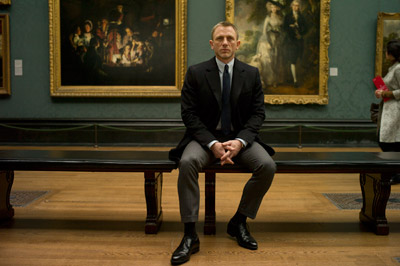 In approaching Skyfall, the 23rd James Bond adventure, the filmmakers were very attuned to the fact that 2012 marks the 50th anniversary of James Bond on film. They were determined that this entry in the longest-running film franchise in history would deliver everything that has made Bond, Bond: heart-stopping action, scene-stealing villains, beautiful Bond women, exotic locations, a killer theme, the Aston Martin DB5� and, of course, 007 himself, played by Daniel Craig. But a Bond film is not a collection of puzzle pieces; these elements combine - like gin and vermouth, shaken, not stirred - to serve the story. For Skyfall, bringing it all together is Academy Award®-winner Sam Mendes. "I knew that Sam Mendes would put everything behind it," says Daniel Craig, who marks his third film as Bond in Skyfall. "He would put all of his knowledge of movie making behind it, but also his knowledge and love of Fleming and Bond."
In approaching Skyfall, the 23rd James Bond adventure, the filmmakers were very attuned to the fact that 2012 marks the 50th anniversary of James Bond on film. They were determined that this entry in the longest-running film franchise in history would deliver everything that has made Bond, Bond: heart-stopping action, scene-stealing villains, beautiful Bond women, exotic locations, a killer theme, the Aston Martin DB5� and, of course, 007 himself, played by Daniel Craig. But a Bond film is not a collection of puzzle pieces; these elements combine - like gin and vermouth, shaken, not stirred - to serve the story. For Skyfall, bringing it all together is Academy Award®-winner Sam Mendes. "I knew that Sam Mendes would put everything behind it," says Daniel Craig, who marks his third film as Bond in Skyfall. "He would put all of his knowledge of movie making behind it, but also his knowledge and love of Fleming and Bond."While Sam Mendes might be best known for directing a different kind of movie, he says that high entertainment and artistic integrity are not mutually exclusive. "I have my own, personal relationship with Bond, which began when I was 9 or 10 years old - when Live and Let Die came out," he says. "We happen to be living in a time when it's possible to make a big, entertaining, glamorous, escapist movie that also says something about the world we live in. With Daniel Craig's performances in Casino Royale and Quantum of Solace, James Bond feels like a real man in a real situation again. It reminded me of the way I felt when I watched the Sean Connery movies."
For the producers Michael G. Wilson and Barbara Broccoli, the anniversary brings with it added expectations. "It's our 50th anniversary and 23rd film so the pressure's on to make the best Bond ever. We have an extraordinary cast, an incredibly talented creative team and an emotionally charged script," says Michael G. Wilson.
Barbara Broccoli adds that Sam Mendes' relationship and history with the Bond films adds a personal element from the very start. "With his knowledge and history, he identifies with the audience - he knows what works and what an audience is expecting. And, frankly, that's great to watch on set," she says.
Throughout these 50 years, it has been the Barbara Broccoli family -first Albert R. "Cubby" Broccoli and partner Harry Saltzman, and then Cubby's children, Michael G. Wilson and Barbara Broccoli - who have been the overseers and caretakers of the James Bond film franchise. "Michael G. Wilson and Barbara Broccoli are extraordinary because they work very well as a team," says Sam Mendes. "Barbara Broccoli has a remarkable skill for making people feel like she knows their name and knows what their issues are, and if there's ever a crisis, she's the one who will handle it. Michael G. Wilson brings an enormous amount of experience and wisdom, combined with such a gentle presence on the set - he never bullies or lectures. If you have an idea and are wondering, 'Has Bond done this before,' ask Michael G. Wilson - he knows."
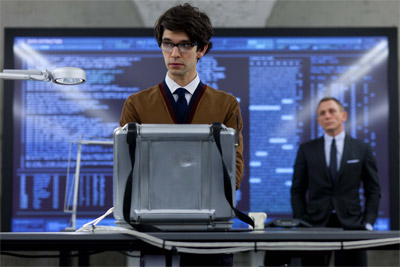 It was Daniel Craig - with the support of Michael G. Wilson and Barbara Broccoli - who invited his friend, Sam Mendes, to direct the film. "When we started talking about it, I felt a connection with someone who had exactly the same enthusiasm and respect for the Bond films that I did," says Daniel Craig. "And, of course, I deeply respect Sam Mendes as a director. I said to him, 'This is going to be a new experience for you - trust me, because I made two of them and it was a very new experience for me. Nothing can quite prepare you.'"
It was Daniel Craig - with the support of Michael G. Wilson and Barbara Broccoli - who invited his friend, Sam Mendes, to direct the film. "When we started talking about it, I felt a connection with someone who had exactly the same enthusiasm and respect for the Bond films that I did," says Daniel Craig. "And, of course, I deeply respect Sam Mendes as a director. I said to him, 'This is going to be a new experience for you - trust me, because I made two of them and it was a very new experience for me. Nothing can quite prepare you.'" Skyfall welcomes back screenwriters Neal Purvis & Robert Wade and introduces Academy Award®-winner John Logan to the Bond writing family. John Logan explains, "I felt greatly encouraged by Sam Mendes and Barbara Broccoli and Michael Wilson to make the screenplay as unique as I could, using my particular strengths as a writer. Coming from the world of theatre, for me, it has always been about character and dialogue. When you look over the vast panoply of Bond films, things tend to emerge, like a lightning bolt: great moments of dialogue, great moments of character interaction - whether it's Bond and Goldfinger, Bond and Blofeld, or Bond and Vesper Lynd. Those are the amazing scenes that just stop your heart because they're unexpected in what's considered a genre movie."
Of course, for each individual Bond film, it is the director who guides and shapes the picture. Sam Mendes says he felt the freedom to put his own stamp on the legendary franchise. "I have been given an enormous amount of freedom - and I've never felt constrained or hidebound by the genre or the franchise," he says. "Part of that is Daniel Craig and Judi Dench, both of whom I already knew well. Frankly, I'd love the two of them to be in any movie I directed. But part of it is also the enthusiasm with which the Producers greeted new ideas about Bond and M and the franchise as a whole."
Judi Dench, returning for her seventh film as M, says that her relationship off-screen with Daniel Craig has mirrored the on-screen relationship between M and Bond that was developed in the two most recent films. "Bond and M are two people who work well together. She's obviously very fond of him, and she's often accused of being preferential towards him - but she can also be ruthless about him," she says. "Daniel Craig and I struck up a good relationship the first time we worked together, and the relationship has developed as each script requires something a little bit more from us. That is especially true with Skyfall."
Barbara Broccoli explains that Skyfall explores the relationship between Bond and M - perhaps more than in any of the 22 previous films. "We wanted to really mine the relationship between Bond and M, because it is the most significant relationship he has in his life," says the producer. "M is the only person who represents authority to him. You have two extraordinary actors, and we just thought - let's go all the way. It's worked extremely well. It's a very emotional story."
"Their relationship is based on mutual respect," says Daniel Craig. "They both know that every time the chips are down, one of them will have to make a sacrifice - it's difficult to have a touchy-feely relationship with someone under those circumstances. But at the same time - and Sam Mendes was very keen on this - Bond's always had in the back of his mind that there's a bit more. It's something he never shows, but the connection is there - and I get a kick out of that as an actor, to play a life you can't show."
007 faces a dangerous journey in Skyfall - one that shakes MI6 to its core as the agency comes under attack. Sam Mendes says that in directing action sequences, character is as important as stunt and camera work. "If you're not engaged with the characters, the action is meaningless, however good it is," he says. "To me, you have to put the characters in a credible and believable situation - you have to make it almost impossible for them to survive - and then show how they survive. That's the challenge."
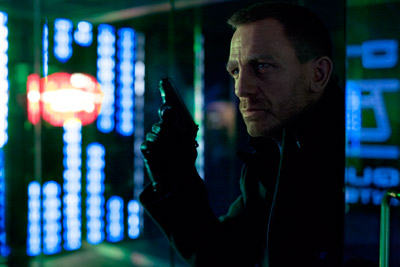 Javier Bardem plays Silva, the man who puts MI6 at risk. The actor is no stranger to playing dark and complex characters, having won the Oscar® for his role as the unforgettable Anton Chigurh in No Country for Old Men. "When I read the script, I was immediately drawn to the story and the character's possibilities. To work with Sam Mendes and to be a part of his incredible cast and crew, I couldn't say no to an opportunity like this," says Javier Bardem.
Javier Bardem plays Silva, the man who puts MI6 at risk. The actor is no stranger to playing dark and complex characters, having won the Oscar® for his role as the unforgettable Anton Chigurh in No Country for Old Men. "When I read the script, I was immediately drawn to the story and the character's possibilities. To work with Sam Mendes and to be a part of his incredible cast and crew, I couldn't say no to an opportunity like this," says Javier Bardem. Sam Mendes says that the key to a great Bond villain is to strike a certain balance. "The performance has to be real enough, but also have flamboyance," he says. "The great ones - the Dr. Nos', the Rosa Klebbs', the Goldfingers' - are ever-so-slightly theatrical and yet are all the more frightening because of it. For Silva, Javier Bardem allowed himself to be playful and mischievous, but never lost the danger, the mystery, the strangeness, the otherness. I think he's done something wonderful."
Bond audiences expect that a Bond film will deliver plenty of action, and as Wilson explains, 50 years of Bond action represents an enormous challenge for the filmmakers: what could Bond do that he's never done before? "We have an incredible team - including Gary Powell (Quantum of Solace, Casino Royale), Chris Corbould (Dark Knight Rises, Inception, seventh Bond film), Alexander Witt (X-Men First Class, Casino Royale, Bourne Identity). They get together with Sam Mendes and formulate the most exciting and interesting sequence we can dream up while still telling the story. And Daniel Craig contributes a great deal to designing the action - he's the one who really pulls it off. He does as much of it as he possibly can - I think the reason the action works as well as it does is because he sells it. That's our one rule - it has to feel real."
And no Bond film is complete without a Bond theme, and for the producers, there was one singer who seemed to be a 21st century heir to the legacy laid down over the past half-century by Shirley Bassey, Tom Jones, Carly Simon, Paul McCartney, Nancy Sinatra, Madonna as well as many others. "The only person that we wanted was Adele," says Barbara Broccoli. "She came to meet with us, she read the script, and she took it very, very seriously. With Paul Epworth, she's written a beautiful song that delivers on every level, and of course she has the most extraordinary voice - she's delivered a classic Bond theme. It's a dream come true to have Adele on board."
About the Casting
At the head of the cast of Skyfall are, of course, Daniel Craig as 007, Judi Dench as M, and Javier Bardem as Silva, a man hell bent on revenge.
Leading the way is Daniel Craig in his third film as James Bond. "Bond is actually remarkably difficult part to play, because he says very little, and the moment you make him say too much, it's not Bond anymore," says Sam Mendes. He operates on instinct a lot of the time. He has his own inner demons and he doesn't reveal them to other characters, and yet the audience needs to be aware of them, especially in this particular movie. In Skyfall the audience has got to see him, in a sense, fall apart and put himself back together again, but none of the other characters see what's really going on behind the curtain. Daniel Craig's done that, I think, brilliantly."
"Daniel Craig's one of the greatest actors that we've ever had," says Barbara Broccoli. "He has inhabited the role of Bond and he's pushed it in directions that one wouldn't have thought possible. Starting with Casino Royale and going into Quantum, and certainly in this film, he really reveals Bond's inner life in a way that we've never seen before, in a way that Fleming does in the books, where you really feel as if you understand the inner turmoil and complexity and conflicts. With this screenplay and with Sam Mendes, we've unearthed a lot of the emotion connected to Bond's own past and mined the dramatic tension that stems from that."
Judi Dench, who returns for her seventh film as M, has left an indelible mark on the character - simultaneously filling a classic role and making it her own. For Skyfall, the chance for the actress to re-team with Sam Mendes was irresistible. "Sam Mendes directed me in 'The Cherry Orchard' when he was very young - it might have been the second or third thing he did - so I know him very well and we have a very good working relationship. We tease each other - we each give as good as we get."
Dench once was able to meet with her real-life counterparts. "I once actually went to lunch with MI6, with Sir David Spedding. And suddenly there they were in a room, six people - it gave me a taste of this organisation and what they have to do. Every time I pass MI6 at night and see the lights on, I think, there is a building where the lights just aren't unnecessarily on. They're on because people are working there all the time."
Javier Bardem describes his character, Silva, as "An angel of death - a very clean-shaven person who happens to be rotten on the inside."
The Oscar®-winning actor explains finding the character inside the villain. "He has a very personal objective - he's not trying to destroy the world," he says. "And he is on a straight line to that objective: he is a man seeking revenge. It's about being focused on the one person he wants to eliminate."
"It's always about who's the person behind the character," he continues. "It would be very difficult for me to play a role that I just saw as some kind of symbol. In this case, there is a man suffering, a man full of pain and frustration, who simply wants to fix the situation. Within that journey, there was room to be funny or aggressive, but I could perfectly understand who he was, and that helped me to portray him."
Surrounding the three lead actors is an extremely accomplished and varied cast, and it was Sam Mendes' reputation as a filmmaker and background in theatre and film that attracted the finest actors in the business. Producer Michael G. Wilson credits Sam Mendes: "It's a great cast, and that's down to Sam Mendes - he attracts really great actors, because they want to work with him."
For Daniel Craig, the most important element he looks for in his fellow actors is commitment to the project. "You have to take the time and the effort to find the right people, enthusiastic people," says Daniel Craig. "We've just been blessed with every character whether it's Ben, or Fiennes, or Bardem, or Finney, or of course Judi Dench. And then the casting of the girls: Naomie and Bérénice - finding two exceptionally beautiful women who are very serious actresses and who are intelligent and work hard. For me, it has been a joy."
Naomie Harris plays Eve, a MI6 field agent. "In recent years, the Bond films have featured two girls - one an exotic type and the other a home-grown type. Naomie Harris manages to be both," says Sam Mendes.
Eve is a brilliant field agent who's very independent, intelligent, witty, fun and courageous," says Naomie Harris. "She's not afraid to stand her ground with Bond, and I think that makes her so much more interesting. Playing Eve really allowed me to highlight the more adventurous side of my personality, which was a lot of fun."
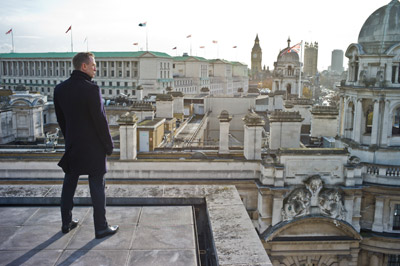 The filmmakers were pleasantly surprised by the extra layers that Naomie Harris brought to the role of Eve. Michael G. Wilson and Barbara Broccoli explain, "The character written was basically a field agent with a lot of sass, but it wasn't until Naomie Harris came in, that we really saw the potential that this character could be something entirely new in terms of a Bond film. She's very resourceful, she gives Bond a really hard time, but you still manage to have a tremendous affection for her and there is a wonderful flirtatiousness between them. She can hold her own with Bond. We think that audiences are really going to relate to her. She's an extraordinary actress."
The filmmakers were pleasantly surprised by the extra layers that Naomie Harris brought to the role of Eve. Michael G. Wilson and Barbara Broccoli explain, "The character written was basically a field agent with a lot of sass, but it wasn't until Naomie Harris came in, that we really saw the potential that this character could be something entirely new in terms of a Bond film. She's very resourceful, she gives Bond a really hard time, but you still manage to have a tremendous affection for her and there is a wonderful flirtatiousness between them. She can hold her own with Bond. We think that audiences are really going to relate to her. She's an extraordinary actress." Casting director Debbie McWilliams officially started work on Skyfall one year prior to filming, but she's always looking out for new and interesting undiscovered talent. "I think I am in a unique position of being able to introduce new talent in leading roles without the usual commercial constraints," she says.
"Audiences want to be surprised and the expectation is always high. We have the world to choose from and it is my job to go out and find those special actors that people may not have heard of before. Submissions were received from all over the world and casting sessions took place in locations as diverse as Shanghai, Stockholm, Madrid, Sarajevo, Athens, Istanbul, Beijing and beyond. "
Another key role in Skyfall is that of Severine, played by Bérénice Marlohe. "If I could have invented a Bond girl, it would be Bérénice," laughs Sam Mendes. "I wanted to find somebody with all of the classic components of a Bond girl: voluptuous, sexy, a woman and not a girl, mystery. Bérénice Marlohe is half-Cambodian, half-French. She gives us that mystery. On top of all that, she happens to be a fantastic actress."
Berenice Marlohe explains that she was encouraged to make Severine unique, "I felt I could use my own personality and imagination to create my character's style - I had the freedom, knowing that this kind of movie allowed me that space."
Writer Robert Wade describes the idea behind Severine, "She's a survivor. Like many of the women in the Fleming books, she's toughened herself up because she knows what it is to have been abused at the hands of men."
Of her character, Berenice Marlohe says, "Severine is the link between Bond and Silva," says Berenice Marlohe. "She's a very mysterious woman. I wanted her to have a lot of substance."
Ralph Fiennes plays Mallory, a government official with oversight of M's agency. Ralph Fiennes explains, "On the surface, Mallory has a charm, an old-world courtesy, but underneath, there's a steel there. He is absolutely able to stand up to M and go head-to-head with her."
Michael G. Wilson adds, "You're not sure where Mallory's loyalty lies in the film - whether he's going to be a help or a hindrance to M and to Bond. He seems to ask a lot of difficult questions and be very critical. It's a very ambiguous character."
In Skyfall, Ben Whishaw becomes the fourth actor to play Bond's quartermaster, affectionately known as Q, who makes a welcome return to the Bond franchise. The role began with Peter Burton as Major Boothroyd in Dr. No, followed by Desmond Llewelyn (in 17 Bond films between 1963-1999), and John Cleese (who appeared as Q's assistant, R, in The World is Not Enough and was later promoted to Q in Die Another Day).
Producers Michael G. Wilson and Barbara Broccoli describe why Ben Whishaw was the man for the job: "When it came to trying to reintroduce the character of Q, it made sense that he would now be a young technical genius and the character was written with that in mind. Ben Whishaw was the obvious choice because he has this wonderful kind of openness to him, and a real intelligence and wit."
John Logan says, "When Bond meets Q, there's initial suspicion of 'Who's this kid, with spots and why is he telling me about my job?' But they quickly develop a mutual respect."
Ben Whishaw adds, "Q represents one of the central conflicts in the film - the old versus the new. It's a battle and a theme that runs through Skyfall, between the way the world is going now and the way that the intelligence services are traditionally run."
That's especially true in an age when espionage takes place in cyberspace as much as anywhere else. "The new Q is a sort of computer genius, one of only six people in the world who has certain knowledge. He's quite a mysterious person with a sly sense of humour," says Ben Whishaw.
Albert Finney plays the role of Kincade, an endearing character from Bond's mysterious past. "Albert Finney is the most extraordinary man; sexy, wonderful and delightful," explains Barbara Broccoli. "I think he is going to be very well remembered in this role because the relationship he has with Bond goes way back and he appears just in the nick of time. It's delightful to have him in a Bond film because Cubby desperately wanted to work with him, and of course I've wanted to work with him, but we have never had the opportunity until now. He is a legend, a fantastic actor and just funny, charming, extraordinary and dead sexy. Be still my beating heart!"
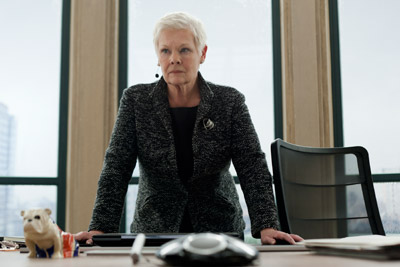 About the Production Design
About the Production DesignOscar®-winning production designer Dennis Gassner returns for his second Bond film, his third collaboration with Sam Mendes, and his seventh collaboration with director of photography Roger Deakins. "I believe that story always comes first when planning to design any given set for any given character," he says. "Throughout the process of Skyfall, I considered Bond's emotional journey and how each environment affects him and vice versa. We built thirty-one sets, but the unsung environments are the locations and London played a big role in this film."
"The opportunity to shoot in London was like a red rag to a bull with Sam Mendes," says Daniel Craig. "We wanted to see parts of London that we hadn't seen before, to use the city in ways that would be impossible in most movies - but Bond's name opens a few doors! London has a real character and that excites me because I love this city and I think it is so rarely represented well on film. We were aiming to capture the madness, the mystery, the danger, and the glamour of London. I think it's a brave and wonderful thing to focus very tightly on the city."
A sizable amount of the story also takes place below London's street surface, an environment that is based on what was historically referred to as the Churchill bunker system. During World War II, many government offices were relocated underground for protection; similarly, in Skyfall, after the headquarters at MI6 are attacked, M makes the decision to relocate.
"It's the kind of question every government has to think about - in an extreme emergency, where do you go?" says Dennis Gassner. "In London, during World War II, they went underground, under the city. That is what M decides to do, and this is where they go."
In this way, even a plot device like moving headquarters beneath the city gives the film a distinctly British feel. Craig says, "In conversations with Sam, we wanted to make Skyfall ingrained with core British values. Making this movie unmistakably British was a dream of ours."
Dennis Gassner illustrates the juxtaposition between a location environment, such as the Old Vic Tunnels, and sets built on sound stages, including the underground MI6 bunker. "We need the sound stage to control the major scenes and accommodate Roger Deakins' brilliant lighting. The Old Vic locations were a pleasure to work in and our recces of usually red taped underground London inspired the sets that we built back at Pinewood. This is the great fusion between locations and set build, one informs the other and they become a unit."
About the Stunts and Effects
Stunts always play a large role in Bond films and Skyfall is no exception. Director Sam Mendes, Second Unit Director Alexander Witt and Stunt Coordinator Gary Powell worked closely together to create a physical and believable journey for Bond. It was important for both Sam Mendes and Gary Powell to approach the film from a more realistic point of view. The action started on the pages. "Writing action sequences is one of the great challenges and the great joys of being a screenwriter," says screenwriter John Logan. "The challenge as a writer on Skyfall was to find ways to make the action as 'Bondian' as possible - which to me means it's tough, it's real and it's heightened."
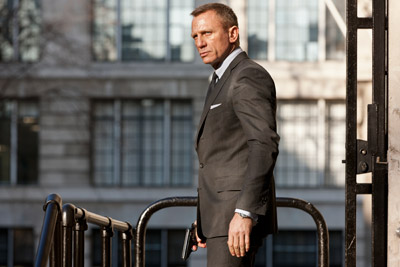 Of course, no actor had more stunts than Daniel Craig. Javier Bardem describes watching Daniel Craig take on the role: "There is some physicality to the role that you have to be prepared to do, but of course mine compared to Daniel Craig's was nothing. And he does the action scenes so easily - From the outside, watching him, I was thinking, 'If I were you, I wouldn't be doing that!'" Javier Bardem laughs. "I mean, I did a little bit, but nothing in comparison to with what Daniel Craig did."
Of course, no actor had more stunts than Daniel Craig. Javier Bardem describes watching Daniel Craig take on the role: "There is some physicality to the role that you have to be prepared to do, but of course mine compared to Daniel Craig's was nothing. And he does the action scenes so easily - From the outside, watching him, I was thinking, 'If I were you, I wouldn't be doing that!'" Javier Bardem laughs. "I mean, I did a little bit, but nothing in comparison to with what Daniel Craig did." "Daniel Craig's an extremely hard working actor, probably the hardest working actor I've ever seen," says producer Michael G. Wilson. "And it's not only the mental preparation, but the physical preparation. He works out like a demon, like a professional athlete. He is really committed to the role, committed to being Bond."
While stunt coordinator Gary Powell appreciates the advance in digital technology and computer graphics, he prefers the action to be real. "All of us, Sam Mendes and Gary Powell especially, felt that we need to push this movie as far as we could. And we've always relied on the fact that we do things for real in Bond movies, and that's just the way it is. If it's CGI, it's just to help out, as opposed to creating the scene. Standing on top of a train, travelling at 50 kilometers per hour, fighting with Ola Rapace going over a bridge was probably a stand out moment."
Barbara Broccoli adds, "Daniel Craig contributes a great deal to designing the action and the fights in particular and he's the one who really pulls it off, because he wants to do as much of it as he possibly can. We were in Turkey for the train sequence and I had my heart in my mouth the whole time; he and Ola were fighting on the roof of a moving train and the moves that they were doing were just heart stopping. Daniel Craig's the reason why the action works as well as it does because he sells it, he's up there and I think audiences know that."
Although the opening sequence lasts only twelve minutes on screen, it took three months of rehearsals and two months of filming to produce. Gary Powell enlisted motocross champion Robbie Maddison, former Top Gear's 'Stig' Ben Collins and British rally car champion Mark Higgins to round out his stunt team. "It's important to lock down the action step by step so my team can learn it like the back of their hand. After rehearsing for months on end, it gets ingrained in the memory, making it less likely to make mistakes," says Powell.
Though the action is fast paced, Sam Mendes says the filming process is not. "I'll put it this way: editing action is a good deal more exciting than shooting action. Shooting action is very, very meticulous, it's increments, tiny little pieces. To me, the challenge is to create parallel action so you're never locked into a linear chase. It's never just A following B, there's something else going on simultaneously, so you're following several overlapping stories at the same time."
Writer Neal Purvis adds, "You can have as many explosions as you like but the dramatic core of it has got to work."
Another undeniable element to the Bond franchise is Bond's car. The Aston Martin DB5 has become synonymous with Bond over the years. Wilson says that when it comes to Bond's wheels, there's one car that says James Bond. "We've flirted with other cars from time to time, but we always do come back to Aston Martin," says Michael G. Wilson. "It's a signature car for Bond and a classic one, his own personal one." And there's no Aston Martin more closely tied to Bond than the DB5, the 60s-era production model that Bond first drove in Goldfinger. For this story, this film, this nod to Bond's history not only would appeal to the fans, but make sense for the story.
Writer John Logan was thrilled by the return of Bond's most iconic car. "We're in love with the DB5! When you think of Bond, you think of certain things very clearly and one of them is that particular car. It is Bond's essential car and in a movie about reorienting Bond to his past and to his future, we just had to use it - beyond the fact it's completely cool."
Daniel Craig too, fell under the spell of Bond's classic car, "I love them, and this story was the perfect platform to re-introduce the DB5. The film is about Bond returning to his roots and confronting old demons, so it felt right. We get some good use out of it, too."
Locations
UNITED KINGDOM: Production on Skyfall was based at historic Pinewood Studios in Buckinghamshire just outside London. Pinewood has become synonymous with the James Bond films over the years, as all but three - Moonraker, License To Kill and GoldenEye - have been filmed there. Thirty-one different sets were constructed on eight sound stages at Pinewood, including the interior of the MI6 underground bunker, the interior of the Golden Dragon Casino, where Bond first meets Severine, and the exterior of the Dead City, an abandoned island off the coast of Macao, where Silva resides.
The 007 Stage was home to the spectacular underground train crash that occurs when Bond is chasing Silva. For the crash, the crew built two full size train carriages, each weighing seven tons. It was too dangerous to allow people to stay on the sound stage, so ten remotely operated cameras were placed inside the 007 Stage to cover the crash from various angles.
The paddock tank doubled as the exterior of the Golden Dragon Casino. The set was lit by three-hundred floating lanterns and two thirty-foot high dragon heads. Twelve artisans were flown in from China create the authentic structures. They were made from wound steel cables, silk fabric and lit from within by 400 light bulbs.
Many exterior scenes for Skyfall were shot on location in central London. Mendes found shooting in London to be a great challenge. "It's my home town," he explains. "I focused on giving it a mythic scale - I tried to give it mood and atmosphere and a sense of a threat. You could say we've shot in some of the expected places, but I hope we've done it in unexpected ways."
Nine different London locations were used around the city. The Old Vic Tunnels doubled as an MI6 training ground, an underground car park on Great Suffolk Street near Smithfield Market served as the entrance to the new MI6 headquarters and the entrance to Broadgate Tower, London's forth tallest building, was dressed and lit to look like an office building in Shanghai, the location in which a fight ensues between Bond and Patrice (OLA RAPACE). The Virgin Active pool in Canary Wharf doubled as Bond's Shanghai hotel pool.
The National Portrait Gallery was used as the setting for a covert meeting between Bond and Ben Whishaw's character. The filming crew worked at night during the museum's closing hours amongst a collection of the world's finest paintings. At sunrise, the unit moved outside to shoot Bond entering from London's landmark Trafalgar Square.
The opening of the teaser trailer shows Bond on the roof of DECC - Department for Energy & Climate Change. The locations department scouted various locations, but the view from the top of the DECC supplied the perfect backdrop for this important scene.
With the cooperation and assistance of the Mayor's Office and Transportation For London, production was able to shut down both Vauxhall Bridge and Millbank for a scene where M witnesses an attack on MI6 headquarters. The explosion was represented by a few fireworks on the day, then an MI6 model was later rebuilt at a third scale on the back lot at Pinewood where Chris Corbould, the film's special effects and miniature effects supervisor, used twenty-eight explosives to replicate the attack.
Over the course of four weekends, production filmed in the London Underground station of Charing Cross. The unit were given access to an out of service line to shoot a sections of the chase between Bond and Silva. The chase continued through Parliament Square up Whitehall, arriving in Trinity Square where the sequence comes to a climax.
Other locations in England that were featured in the film were the Old Royal Naval College and Hankley Common in Surrey.
SCOTLAND: In the penultimate James Bond novel, You Only Live Twice, Fleming gave Bond a sense of family background, writing that Bond's father was from Glencoe, Scotland. Glencoe has one of the most iconic landscapes in Scotland - the mountains contain some of the oldest sedimentary and volcanic strata in the world. These mountains served as a beautiful backdrop for Bond and M's drive through Glencoe's scenic roads in the iconic Aston Martin DB5.
CHINA: John Logan describes how Shanghai plays an important role in the storyline: "What we were looking for was opposition to London. We wanted exotic locations that seem so unlike the world that he grew up in, the world that he functions in, in a way trying to find places for Bond to be uncomfortable."
Second Unit Director Alexander Witt and the second unit traveled to Shanghai to shoot establishing shots and driving sequences. The crew worked nights in the busy week leading up to the Chinese New Year to capture the exhilarating, ever-changing metropolis that is one of the most dynamic cities in the world. An aerial unit piloted by Marc Wolff was granted rare access to the skies above the city to shoot from a helicopter on loan from the Chinese government. Dennis Gasser and the art department worked to create the rest of the Chinese environment at Pinewood Studios.
TURKEY: The highly anticipated pre-title sequence for Skyfall was shot in Istanbul and Adana. When Bond realises that vital information has been stolen from an injured MI6 agent he chases the assailant Patrice with the help of Eve through the crowded and vibrant streets of central Istanbul. Bond races through Eminonu Square, one of Istanbul's oldest and most magnificent squares, which is surrounded by the ancient Spice Bazaar and the fabulous Yeni mosque. The art and props department created an enormous market area within Eminonu Square housing over two hundred and fifty dressed market stalls that Bond passes through on motorcycle.
The high-speed pursuit continued on the rooftops and then inside Istanbul's famous Grand Bazaar. The Grand Bazaar is one of the largest and oldest covered markets in the world, with 61 covered streets and over three thousand shops attracting up to 400,000 visitors daily. Due to the hazardous nature of the sequence, access to the location for the film unit could only to be granted on Sunday, when the bazaar is closed. Through a combination of efforts from the locations department, set decoration, art and props teams, the bazaar was dressed overnight on preceding Saturday nights to look like the hive of activity that the one would expect from the location. 500 Turkish extras and stunt background were brought into the Grand Bazaar to provide the location with its usual crowded and buzzing atmosphere. The rooftops of the Bazaar served as a spectacular platform to view Istanbul's ancient and dynamic skyline. The production went to great lengths to protect and preserve the Grand Bazaar's historic architecture, which included floating reinforced steel roof panels over the existing tiles to protect the original structure.
The chase required a fleet of twelve Land Rover Defenders and sixteen Audi A5's, all modified and reinforced in different ways to the requirements of the stunt and camera departments. Two of the Defenders had driving 'Pods' fitted to the roof of Eve's car, allowing Naomie Harris to concentrate on delivering dialogue while being driven by former 'Stig' Ben Collins at 50 mph through the packed streets of town.
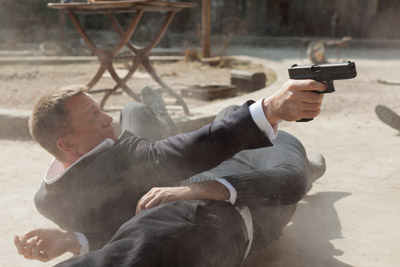 Skyfall marks the third Bond film to be shot in Istanbul. The first was From Russia With Love (1963) where Ian Fleming himself accompanied Cubby Broccoli, Harry Saltzman and the shooting crew on location, and the second a brief visit on The World Is Not Enough (1999).
Skyfall marks the third Bond film to be shot in Istanbul. The first was From Russia With Love (1963) where Ian Fleming himself accompanied Cubby Broccoli, Harry Saltzman and the shooting crew on location, and the second a brief visit on The World Is Not Enough (1999). From Istanbul production moved to Adana to continue shooting the chase where Bond follows Patrice onto a speeding Turkish passenger train.
Adana is a modern city in the agricultural heartland of Turkey, close to the Eastern border. This was to be the setting for a major beat in the chase sequence featuring one hundred speeding cars and vans, a high-speed lorry crash, a show stopping motorcycle stunt performed by motorcycle aficionados Lee Morrison and Robbie Maddison, and of course the train sequence.
The chase on the train presented a number of challenges for the production. Working on a moving train was one of the most complicated and technically demanding parts of the opening sequence.
The climax of the stunt sequence took place at the breathtaking Varda Bridge, an hour outside of Adana. Varda Bridge was built in 1912 and is five hundred and seventy feet long and three hundred feet high. The fight comes to an end when Eve accidentally shoots Bond instead of Patrice, sendi
MORE
- Mission: Impossible Fallout
- Glenn Close The Wife
- Allison Chhorn Stanley's Mouth Interview
- Benicio Del Toro Sicario: Day of the Soldado
- Dame Judi Dench Tea With The Dames
- Sandra Bullock Ocean's 8
- Chris Pratt Jurassic World: Fallen Kingdom
- Claudia Sangiorgi Dalimore and Michelle Grace...
- Rachel McAdams Disobedience Interview
- Sebastián Lelio and Alessandro Nivola...
- Perri Cummings Trench Interview



